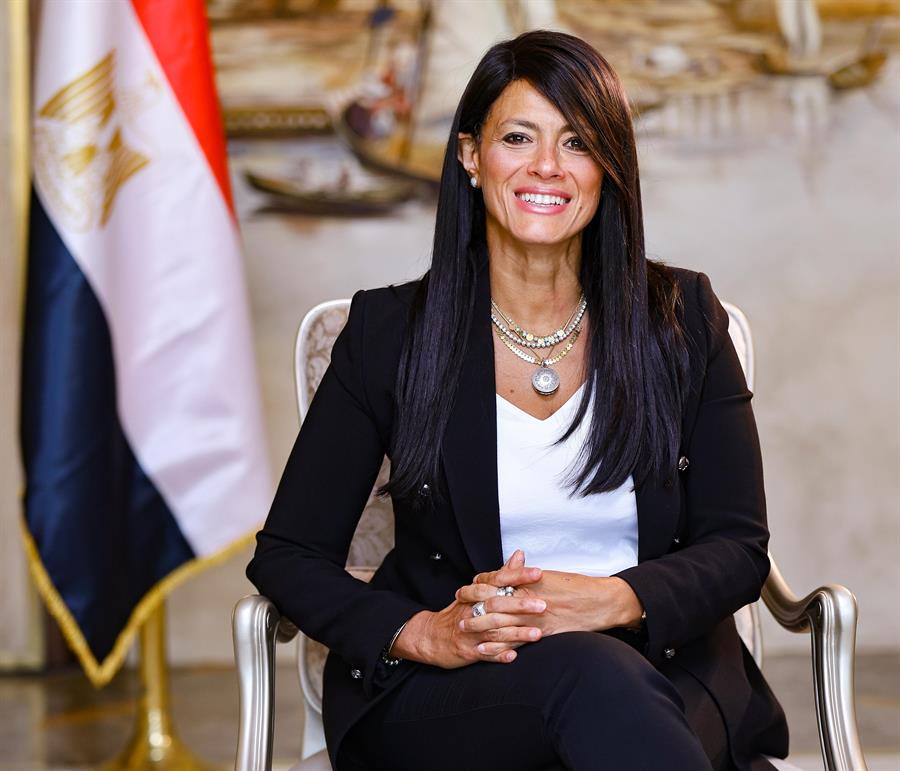After announcing the recommendations of the President for the field of entrepreneurship: The Minister of Planning and Economic Development meets with the Rowad 2030 project team to discuss the implementation of the recommendations of the President

20 January 2022
Dr. Hala El-Said, Minister of Planning and Economic Development, met with the Rowad 2030 project team to discuss the implementation and activation of the recommendations of President Abdel Fattah Al-Sisi in the field of entrepreneurship that he announced at the closing session of the fourth edition of the World Youth Forum that was held in Sharm El-Sheikh a few days ago.During the meeting, Dr. Hala El-Said directed the implementation and launch of the "One Million Entrepreneurs" campaign for Arab and African countries and its availability in Arabic, English, French, and sign language, and the implementation and launch of the "Start Your Future" campaign for school students in Arab and African countries.This is in addition to the launch of the Egyptian-African incubator to reach more African countries, and the creation of the "Rowad Meter" platform to provide indicators of entrepreneurship in Arab and African countries.Dr. Hala El-Said also directed the implementation of the program to qualify incubators managers in Arab and African countries, which works on managing incubators and designing the incubation program according to international standards, in cooperation with the American University in Cairo (AUC).For her part, Dr. Ghada Khalil, Director of the Rowad 2030 Project, indicated that the inclusion of the entrepreneurship file in the fourth edition of the World Youth Forum this year is one of the main axes; It reflects the interest of the political leadership in this file. Khalil emphasized that entrepreneurship contributes to creating job opportunities and diversifying sources of income, thus contributing to the desired economic development.During the meeting, the minister listened to an explanation of the latest work of the Rowad 2030 project; which includes the “One Million Entrepreneurs” campaign and aims to qualify one million Egyptian entrepreneurs of all ages and different cultural backgrounds and those interested in the field of entrepreneurship by 2030.
The platform provides a large package of online topics in Arabic, English, and sign language, in three different qualification stages, to reach the development of the basic skills required to qualify entrepreneurs.The project also presents a campaign (Start Your Future) at the school level, where the second phase was implemented, and the campaign's training package was approved by the University of Missouri, USA. The second phase of the campaign has been implemented in 9 governorates so far; it offered training to 50 trainers on the campaign curriculum, and more than 500 teachers from 84 schools.The campaign targeted more than 345,500 students in the preparatory stage, in addition to preparing 30 classrooms inside schools whose teachers have been trained on the entrepreneurship curriculum.Concerning the incubators file; The Rowad 2030 project has established 10 public and specialized business incubators, including an artificial intelligence incubator and a tourism incubator, in addition to establishing a mini-factory in cooperation with the Nile Pioneers Initiative.With regard to the “Be a Pioneer” campaign, the campaign aims to encourage the pioneering thinking of the children of government employees and discover real entrepreneurs by creating applicable pioneering ideas. The campaign was launched in the Ministries of Finance, Education, and Technical Education.The Rowad 2030 project had participated during 2021 in several events, including the jury of the Rollo Africa competition, the Employment and Youth Support Forum with the Ministry of Youth and Sports, the Egypt Rally for Entrepreneurship at the Arab Academy for Science, Technology and Maritime Transport, and the Egypt Retail Summit.The project also participated in the activities of the Eleventh Annual Forum on Social Responsibility and Sustainable Development in Egypt, the Global Internships summit, the My Job Forum, the We Share Campaign, and the annual RiseUp Summit for Entrepreneurship and Startups.The project participated in the activities of the first conference of offices to support innovation, technology transfer, and commercialization, the opening of the Enroots incubator in Luxor Governorate, as well as participation in the Dubai Expo, and finally the World Youth Forum (WYF).









